So, I’m biased here. I’ve been journaling since I was about 7 years of age.
I can’t exactly remember what got me into it — probably because I received some snazzy, quintessentially 90s blank Lisa Frank book and already had a proclivity to draw on the backs of my grandparents’ discarded electrical bills. Either way, it began a tradition in my life of recording life’s events, musing, complaining, creating, and rewriting my own personal history.
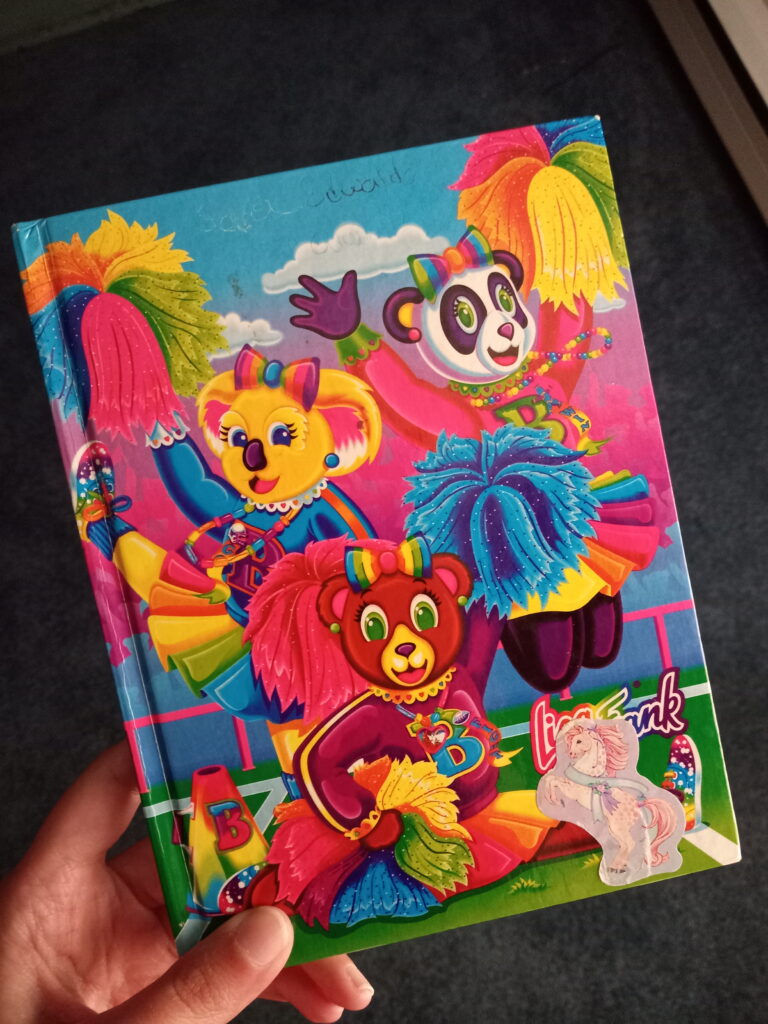
I feel fortunate that I got into this at a young age, as it evolved into a personal tradition. I would record, reread, reflect, and share my experiences with close friends.
My early journals are colorful, full of drawings, 90s gel pen markings, scribbles, cut up pictures and souvenirs, guest entries from others, among other things. There was an experimental, scrap-book feeling to them, overlaid by cringeworthy musings that only an elementary, middle, and then high school student can create. One journal might last a few years, and the next would contain entries from just a few months before it was full. Some were full of pictures and memories, and others contain creative endeavors and angsty thoughts.
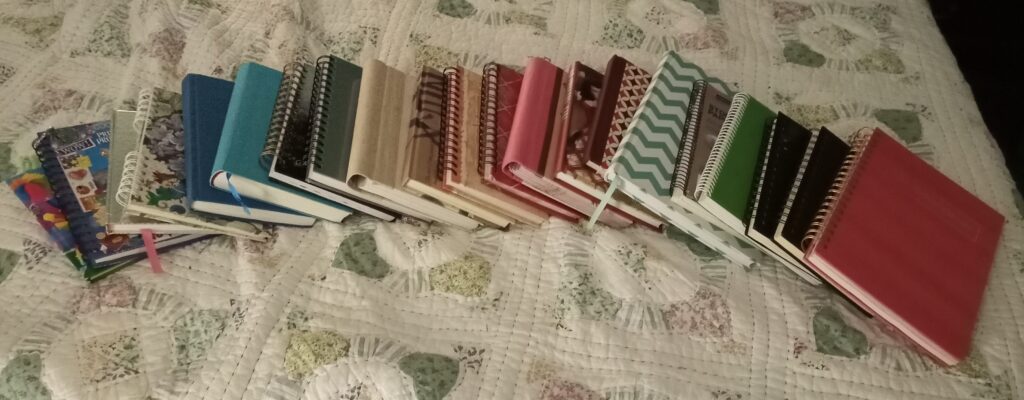
At some point, my journals became regimented, standardized, precise: I would need to get everything exactly right, details, locations, times, events — I would draw maps, record time to the minute, ensure my lines were neat and tight, with well-shaped letters, blue or black ink, and mistakes swiftly corrected.
And then, there was a break in time — for over 4 years, I took off of writing, declining to record much of the time I spent in higher education. An observer might surmise that I took that time to study, to focus in on my career path, to exert myself socially. While these things certainly did occur, I know another reason: my journaling took on a perfectionistic tone that I was unable to hold myself to.
Indeed, I had put pressure on myself to record things correctly: To write soon after a life event so it could be correct; To offer a complete and detailed account of things; To keep up with all the various life changes I was undergoing, relationships I was forming, things I was learning, let alone my own personal reactions to and thoughts on the aforementioned.
This pressure I put on myself, this perfectionism, had killed my creativity. It inhibited me from recording events, which led to my total immobility to create, and instead I chose to abstain. As I continued through this time, the events I had to record continued piling up: if I didn’t record this thing from April, then I had to put that down on paper before I talked about this thing that happened in May, right? The readers would be confused! I have to offer proper context, right??
The thing I didn’t ask myself for years, years I was procrastinating, wanting to journal, and feeling subsequently guilty, was, who is my audience? Who else would read these, but me? And would I even reread them? Was the purpose of journaling the reading? Or rather, the writing? Was my purpose in writing to accurately serve as an auto historian, recording my life’s events? Or could I repurpose my writing?
I had to do a total overhaul of my thinking on journaling. The perfectionism I had developed, the rules I created and held myself to, had a stranglehold on my creativity, and prevented me from embarking on an endeavor I had loved for literally most of my life, and this went on for years. This loss feels large to me now. Not because of the events I had not recorded, but rather the catharsis I could have experienced, the creative process I could have enjoyed, that I did not allow myself to pursue, because I was holding myself to an unrealistic standard.
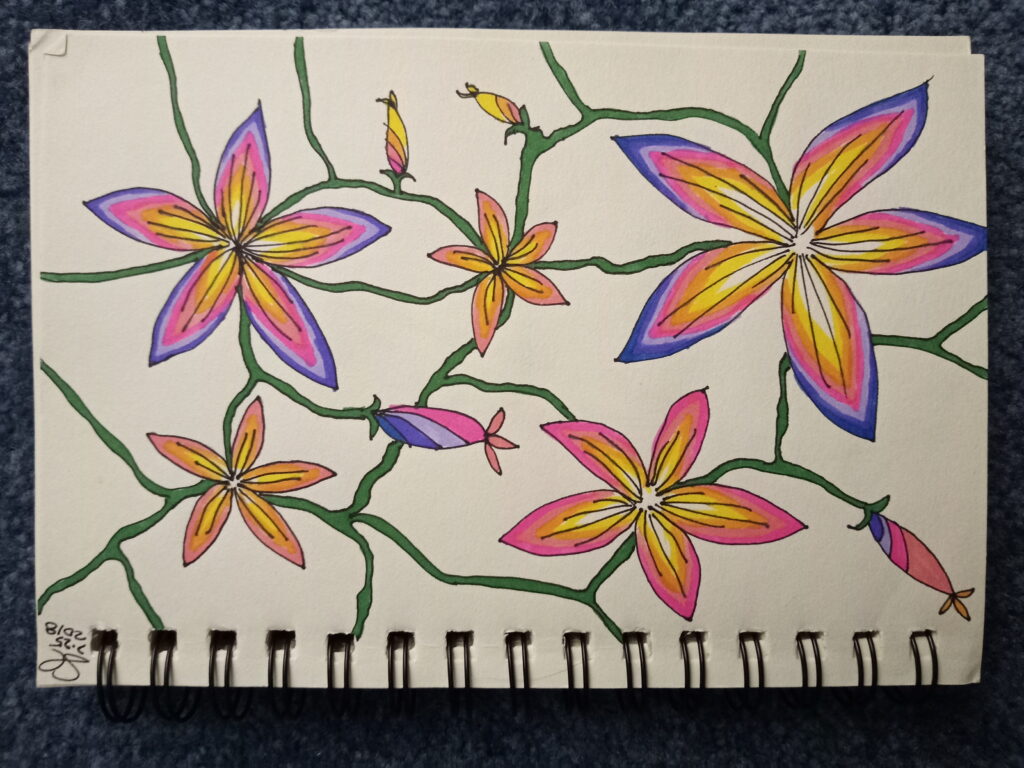
I eventually allowed myself to break back into journaling. Yes, I allowed myself to redefine what I wanted to accomplish, what my intended goals and outcomes were in writing and drawing.
Rather than beating myself up over “losing” years, I chose to re-envision my participation in creating, writing, drawing, putting a writing utensil on paper: that was what I set out to do, and it was enough. To just put something on paper. To just write a few sentences, or a word with some cute calligraphy, or a terrible cartoon, or some colors, or whatever else I was feeling in the moment. Lamentations, angry letters, bulleted lists: it was all allowed to be fair game.
By broadening my definition of success, I enabled myself once again to release the creative energy that I allowed myself to feel, to access, in my younger years.
I notice that I’m not the only one who did, or does this — that is, allows myself to fall into this pit of perfectionism so stringent that I can’t move, can’t budge, and can’t do anything but procrastinate and feel guilty, an ever tightening and worsening spiral that keeps me from doing the things I want to do, the things I enjoy, or the things that will make my life better.
I hear often from folks who wish to take up journaling — whether penning reflective pieces, recording events, creating organizational tools, writing or drawing — that it is difficult to begin, and difficult to maintain. Folks create rules like “I’ll start on the first of the month” or “I’ll begin on January 1st so it can be a fresh year” or “I’d have to do it every day” or “I have to write *this* much or it wasn’t worth it” or “I have to write something coherent.” I often hear lamentations from folks who are sorely disappointed that they were unable to “keep up” with journaling. These rules strike me as the same ones that I had set for myself, and the perfectionism inherent in them — the assertion that there is a “right” way to journal — is a level of strictness that inhibits human creativity.
If journaling is of interest to you, I encourage you to broaden your horizons. Rewrite the rules. Allow yourself to fail.
Allow yourself to write something and not finish. Allow yourself to make something ugly. Allow yourself to make a spelling mistake, to draw something wrong in pen, to cross something out, to create a journal entry just called “Tuesday” and draw a cup of coffee that you spill actual coffee on, I don’t know, literally whatever.
It’s all progress because you’re doing it.
It’s ok to journal something and then take years off. It’s ok to buy a new journal that gets you excited, write a poem in it that upon further reflection makes you want to hide under your bed. It’s ok to write a list that you won’t reference until next September. It’s ok to need to google “journal prompts” and then write a sentence and then quit. It’s ok because you’re doing it. Every step is a step forward.
Journaling helps people to relax, to focus, to record, to organize. Journaling can be a form of mindfulness. Journaling can be a connective activity, a singular reflection, a group process. Journaling can turn into writing more and more, and journaling can turn into scrawling a moustache on an old photo of yourself and need be nothing more.
I have so many journals it gets confusing. I have things I love to reread and remind myself of, I have things I want to burn and never allow to see the light of day. I write on here and I consider it journaling. Sometimes I worry about the length between my posts, and the subject matter. I allow myself to be ok with that, and tell myself that even just doing anything is progress and a step forward.
If you want to take up journaling, I greatly welcome you sharing a ridiculous page with me. Any marking on that paper is a victory. I’ll share some, too.
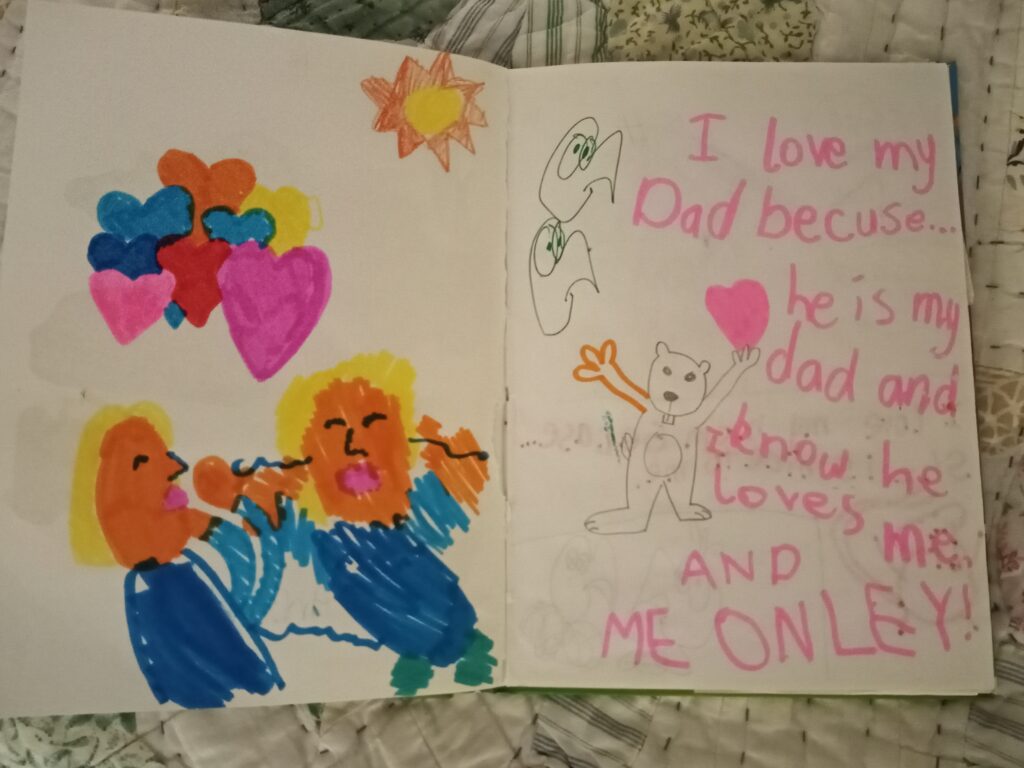
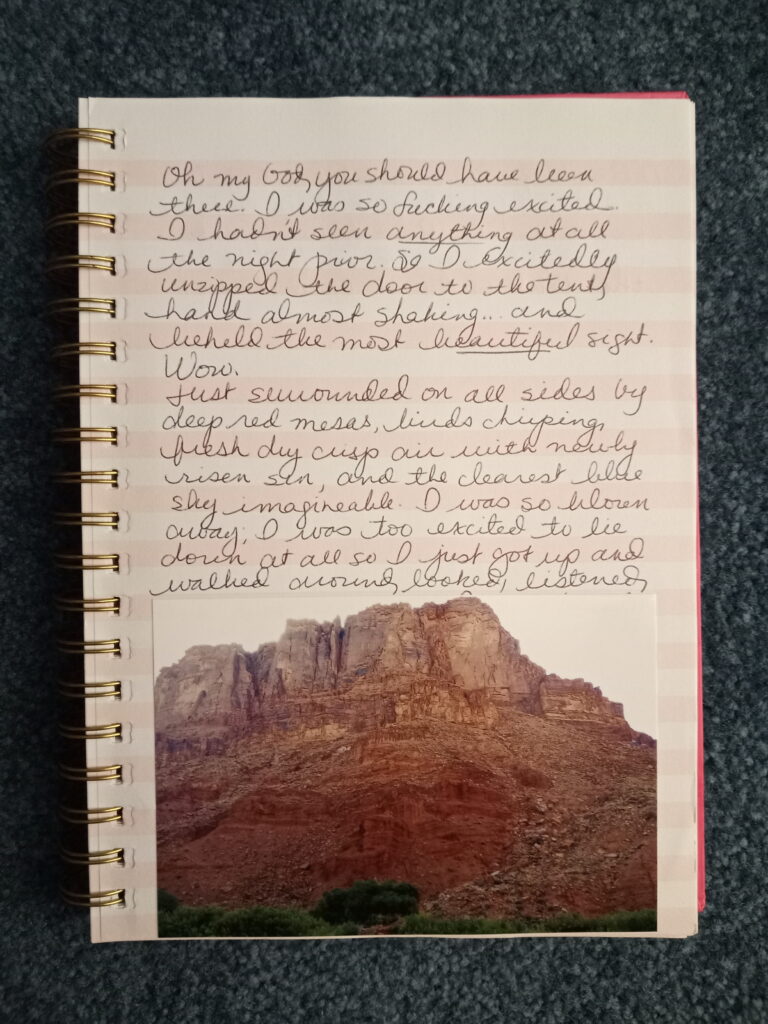
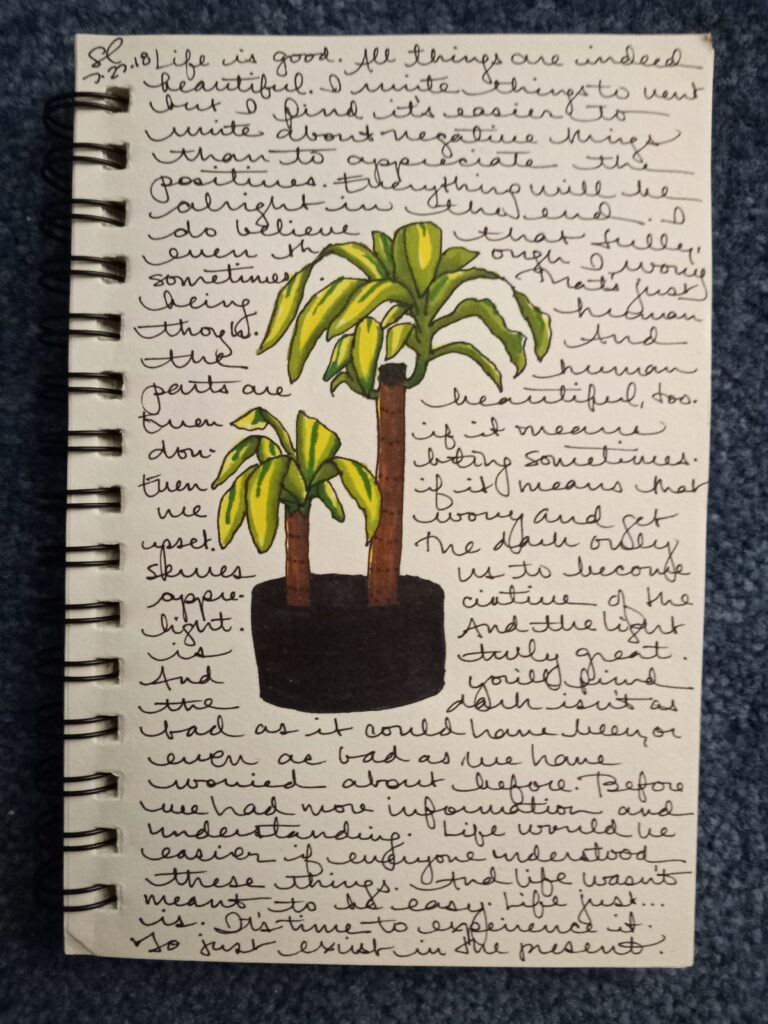
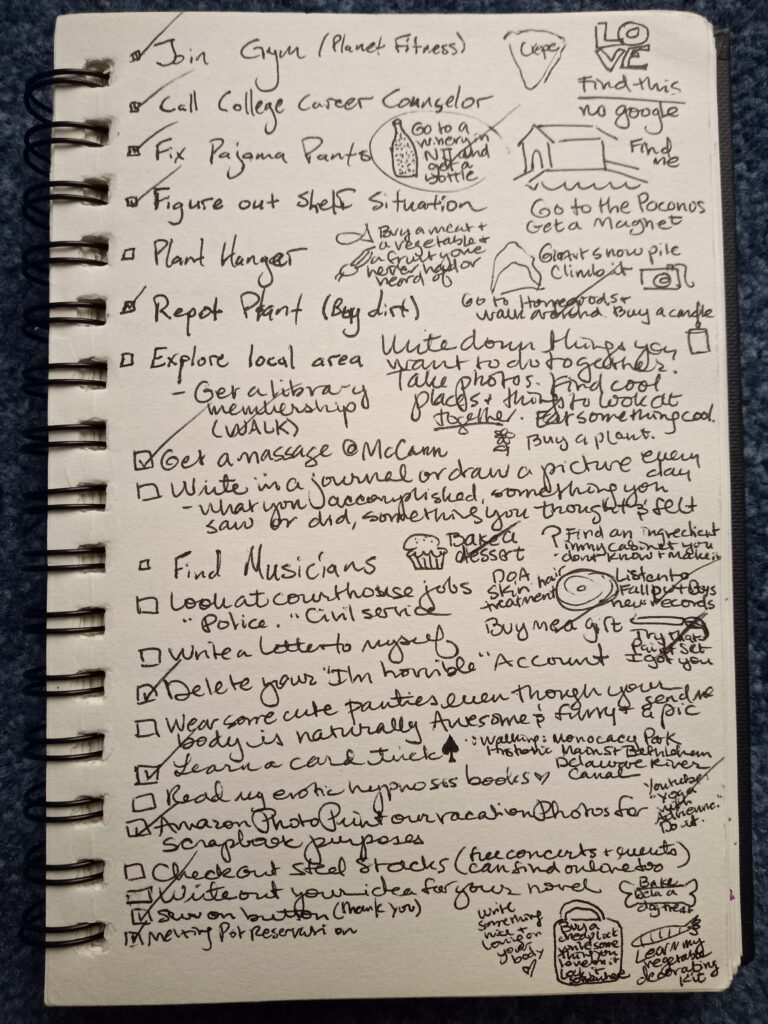
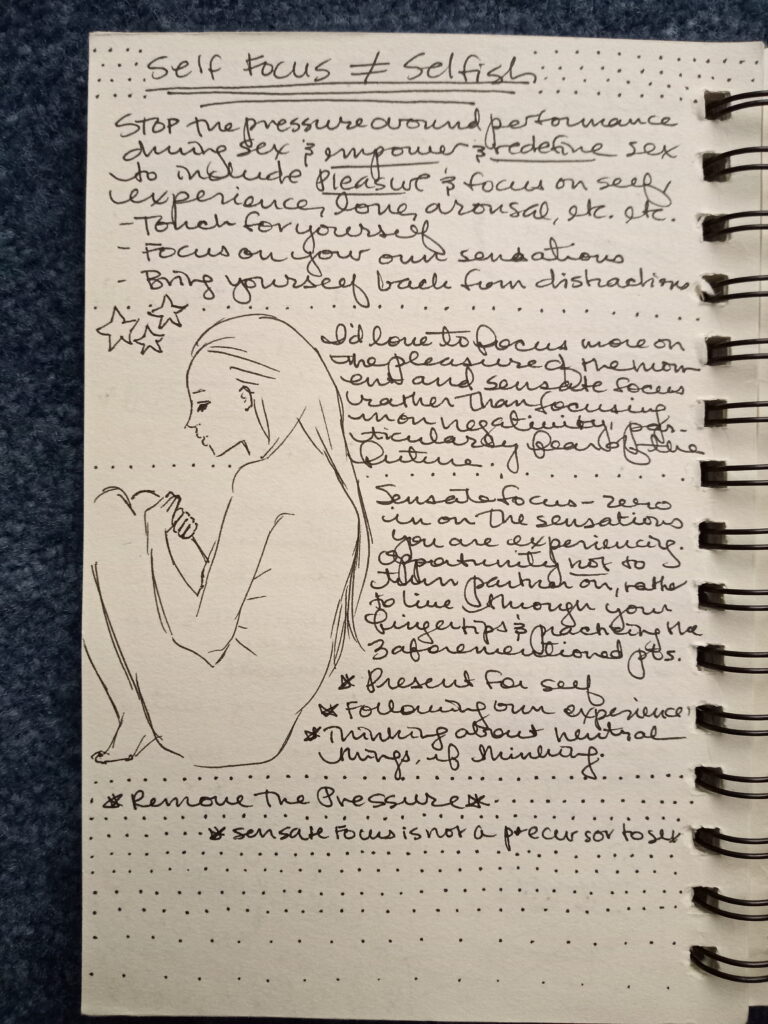
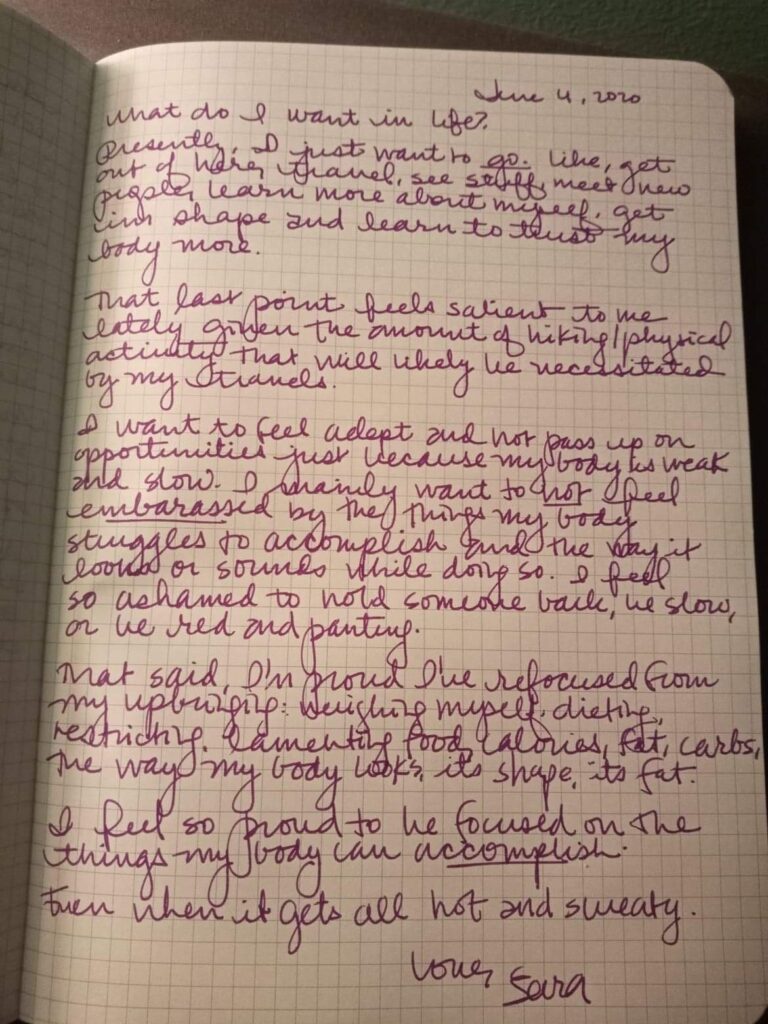

1 Reply to “Let’s Journal”
Comments are closed.